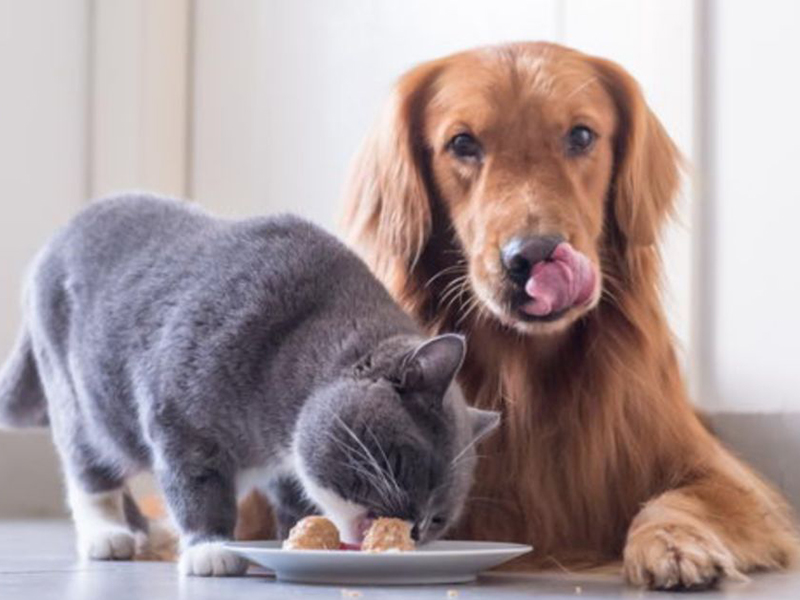Pet food refers to specially formulated food intended for consumption by pets, such as dogs, cats, and other companion animals. Unlike human food, pet food is designed to provide the necessary nutrients and energy for pets to maintain a healthy and balanced diet.

Dry Food
Dry food, also known as kibble, is one of the most common types of pet food available in the market. It is convenient, has a long shelf life, and promotes dental health by reducing tartar buildup. Dry food often contains a balanced mix of protein, carbohydrates, and fats.
Wet Food
Wet food, also referred to as canned food, comes in moist form and provides higher moisture content compared to dry food. It is palatable and can be beneficial for pets who need additional hydration. Wet food is often rich in meat and has a softer texture.
Raw Food
Raw food diets, also known as BARF (Biologically Appropriate Raw Food) or PMR (Prey Model Raw), consist of uncooked ingredients such as raw meat, bones, fruits, and vegetables. Proponents of raw food diets believe it mimics a more natural diet for pets and promotes overall health.
Nutritional Requirements for Pets
Pets have specific nutritional requirements that vary based on factors such as species, breed, age, and activity level. A balanced pet diet should include proteins, carbohydrates, fats, vitamins, and minerals. Providing the right nutrients is crucial for maintaining optimal health and supporting their immune system.
Importance of High Quality Ingredients
High-quality ingredients play a vital role in pet food. Look for pet food that contains real meat as the primary protein source, whole grains or vegetables for carbohydrates, and healthy fats. Avoid artificial preservatives, colors, and fillers as they offer limited nutritional value.
Common Ingredients in Pet Food
Common ingredients in pet food include chicken, beef, fish, rice, sweet potatoes, and various fruits and vegetables. These ingredients provide essential nutrients and contribute to the taste and texture of the food.
Understanding Pet Food Labels
Reading and understanding pet food labels is essential for making informed choices. Look for labels that indicate the food meets the standards set by reputable organizations and provides a complete and balanced diet for your pet. Pay attention to the ingredients list, guaranteed analysis, and feeding instructions.
Choosing the right pet food can be overwhelming with numerous options available. Consider the following factors when selecting pet food:
Age and Life Stage Considerations
Pets have different dietary needs at various life stages, such as puppies and kittens, adult pets, and senior pets. Choose pet food specifically formulated to meet the nutritional requirements of your pet's life stage.
Breed and Size Considerations
Certain breeds and sizes of pets may have specific nutritional needs. Large breed dogs, for example, require diets that promote healthy bone and joint development. Consult with your veterinarian to determine the best food for your pet's breed and size.
Special Dietary Needs
Some pets may have special dietary needs due to allergies, sensitivities, or underlying health conditions. In such cases, specialized diets that cater to these specific needs may be recommended.
Establishing proper feeding guidelines is essential to maintain a healthy weight and ensure adequate nutrition for your pet.
Portion Control
Follow the recommended portion sizes provided by the pet food manufacturer based on your pet's weight and activity level. Adjust the portions as necessary to maintain a healthy body condition.
Frequency of Feeding
The frequency of feeding depends on your pet's age and individual needs. Puppies and kittens usually require more frequent meals, while adult pets can thrive on two meals a day. Senior pets may benefit from smaller, more frequent meals.
Treats and Supplements
Treats can be a part of your pet's diet but should be given in moderation. Ensure they are nutritious and do not exceed the daily calorie intake. Discuss with your veterinarian before adding any supplements to your pet's diet.
Proper storage and handling of pet food are crucial to maintain its freshness and prevent contamination.
Proper Storage
Store pet food in a cool, dry place, preferably in an airtight container. This helps preserve the food's quality and prevents pests from accessing it. Avoid storing it in areas exposed to direct sunlight or high humidity.
Avoiding Contamination
Wash pet food bowls regularly with hot, soapy water to prevent the buildup of bacteria. Ensure that your hands are clean before handling pet food to avoid any contamination.
Providing the right pet food is vital for the overall health and well-being of our pets. Understanding the different types of pet food, nutritional requirements, and proper feeding guidelines allows us to make informed choices that meet their specific needs. Remember to consult with your veterinarian for personalized advice based on your pet's individual requirements.

Is homemade pet food better than commercial pet food?
Both homemade and commercial pet food can be nutritious when formulated correctly. However, homemade diets require careful planning and monitoring to ensure all essential nutrients are provided. Consult with a veterinary nutritionist before preparing homemade pet food.
Can pets be vegetarian or vegan?
While some pet owners choose to feed their pets vegetarian or vegan diets, it's essential to consult with a veterinarian to ensure all nutritional needs are met. Pets have specific dietary requirements that may be challenging to fulfill with a vegetarian or vegan diet alone.
How do I transition my pet to a new food?
When transitioning your pet to a new food, do it gradually over several days to avoid digestive upset. Mix small amounts of the new food with the current food, gradually increasing the proportion of the new food until the transition is complete.
Are grain-free diets suitable for all pets?
Grain-free diets have been a topic of debate in recent years. While they may be suitable for some pets, it's crucial to consult with a veterinarian before choosing a grain-free diet. Grains can provide valuable nutrients, and some pets may have specific grain allergies or sensitivities.
Can I feed my dog or cat table scraps?
Feeding table scraps to pets is generally not recommended. Human food may contain ingredients that are harmful to pets, such as spices, seasonings, or toxic substances. Stick to a balanced diet formulated specifically for pets to ensure their nutritional needs are met.